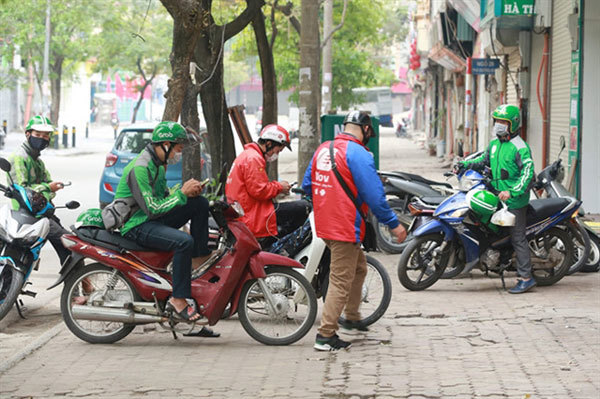 |
| Drivers for ride-hailing services can enjoy the Government's relief package from April to June. Photo thanhnien.vn |
Three years ago, Hoa and his wife left their hometown – in Phu Tho Province – in search of a new life in Long Bien District, Hanoi.
He works as a freelance motorbike driver for the ride-hailing service Grab, while his wife cooks at a kindergarten canteen. They struggle to make ends meet and raise two children in the big city.
The COVID-19 pandemic has turned their lives upside down.
“Due to school closure, my wife stays at home to take care of the children. I worked 10 to 12 hours a day, earning VND200,000 (US$8.6) daily to support the whole family,” Hoa told Thanh niên (Young People) newspaper.
“For a fortnight, ride-hailing services have been hit badly by the disease. I cannot make a single penny. If the situation worsens, I do not know how we will survive,” he added.
Hundreds of migrant workers in the informal sector like Hoa, have hustled back home while the others choose to stay, clinging to hope that the pandemic shall pass.
However, with all the complicated developments, they seem to be caught in between.
Nguyen Thi Hoan, a scrap collector from Nam Dinh Province, said she did not dare to go home.
“I’m afraid to be sent to a quarantine camp. My landlord has reduced the monthly rent from VND1.5 million ($64.4) to VND1 million ($43). I received donated instant noodles and eggs, too,” she said.
With the 15-day nationwide social distancing order, starting from April 1, all unnecessary services have been suspended, wiping out jobs of thousands of informal workers.
Nguyen Thanh Nhan, a massage practitioner from Thanh Hoa Province who works at a spa on Thai Thinh Street, said their wage was meagre, about VND1.5 million per month.
“Our income comes mostly from tips. Because of the disease, the spa did not have any customers. Being the family’s breadwinner, for the first time can I really feel the financial burden. My only wish at the moment is to have it contained. I just cannot hold on any longer,” she said.
On April 10, the Government approved a US$2.6 billion relief package to support the most vulnerable to the COVID-19 pandemic.
It is estimated that 20 million people will enjoy the bailout including workers in the informal sector.
Minister of Labour, Invalids and Social Affairs Dao Ngoc Dung said that the group was the most affected by the disease. Each of them will receive assistance of VND1 million for three months from April to June.
“The ministry will ask the Prime Minister to decide on certain groups, focusing on manual labourers including vendors, scrap collectors, porters, motorbike taxi drivers, cyclers, lottery vendors and servants at eateries, rooming houses or medical facilities,” said Dung.
“We ensure to support people who need the assistance the most, in a timely and transparent manner,” he added.
According to the International Labour Organisation, there are nearly 18 million Vietnamese workers in the informal sector. They do not have a labour contract while earn low wages. Losing jobs in the time of COVID-19, to them, means losing income without being able to receive unemployment benefits. — VNS

Nearly 70,000 labourers in Hanoi lose jobs amid COVID-19 pandemic
Nearly 70,000 labourers had lost their jobs amid the COVID-19 crisis as many enterprises in Hà Nội have been forced to scale down production or temporarily suspended operations, the city’s Confederation of Labour has announced.

Solutions needed to support COVID-19-affected labourers
Bui Sy Loi, vice chairman of the National Assembly’s Committee for Social Affairs talks about solutions to support labourers after many enterprises have declared bankruptcy or been temporarily suspended operations due to the COVID-19 pandemic.
 Four people in Dinh Anh Hoa’s family have been jammed in a 16sq.m-bedsit for two weeks.
Four people in Dinh Anh Hoa’s family have been jammed in a 16sq.m-bedsit for two weeks.